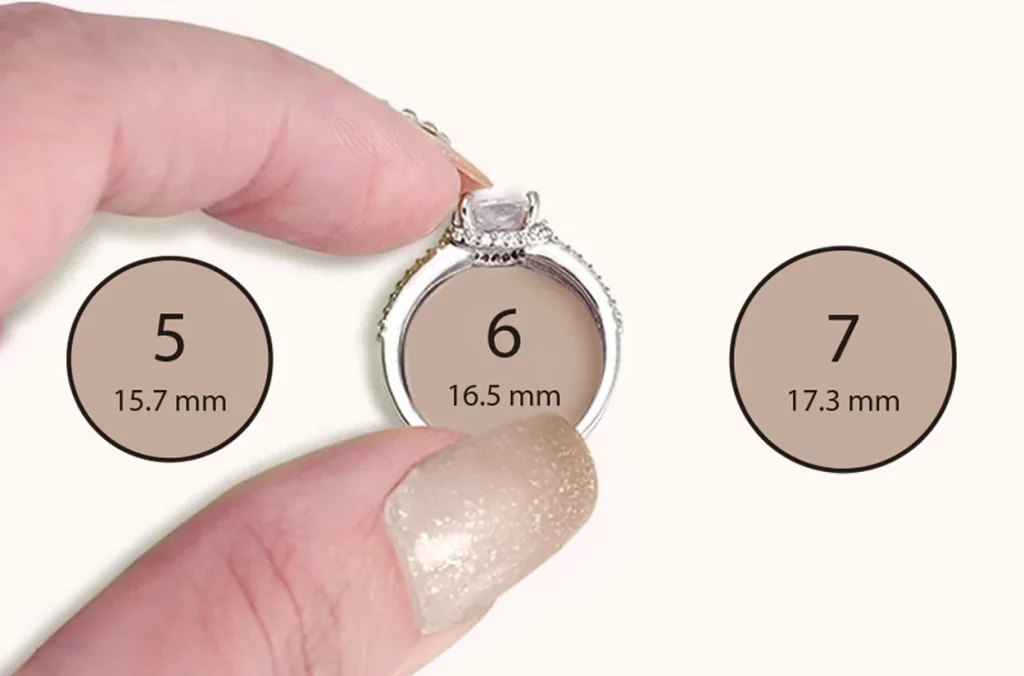
Frequently Asked Question
A ring size chart usually provides sizes by country, diameter in millimeters, and circumference in millimeters. To understand it, you need to know which country’s system you are using (US, UK, EU, etc.), and then find the corresponding sizes.
To find your ring size using a ring size chart, you need to measure the circumference or diameter of your finger. You can use a piece of string or paper strip to wrap around your finger, mark the point where it overlaps, then measure its length with a ruler. Compare this measurement with the chart to find your size.
Many ring size charts include multiple international ring size systems (like US, UK, EU). You can simply find your size in one system and look horizontally across the chart to find your size in the other system.
First, you need a string or a strip of paper. Wrap it around your finger where you want to wear your ring. Mark the point where it overlaps to form a complete circle. Measure the length of the string or paper from the end to your mark. Use the chart to find the ring size for the corresponding circumference or diameter.
Ring size charts use two primary measurements: diameter and circumference. The diameter is the distance across the circle, while the circumference is the total distance around the circle. Both are usually listed in millimeters.
FAQs
Find a chart that includes both US and UK sizes. Locate your known ring size in either the US or UK system, then look horizontally across the chart to find the corresponding size in the other system.
If you know your ring size, you can find the corresponding diameter on the ring size chart. If you have a ring but don’t know the size, you can measure the inner diameter of the ring and compare it with the chart.
To find the perfect fit, measure your finger at the end of the day when it’s at its largest. Remember that your left and right hands may have different sizes. After taking measurements, compare them to the ring size chart to find your perfect size.
To create your own ring size chart, you’ll need a ruler, a piece of paper, and a pen. Draw lines on the paper corresponding to the different diameters and circumferences of rings, then mark them with the corresponding ring sizes.
If you already have a ring that fits well, you can measure its interior diameter and compare it with the diameter sizes on the chart. If not, measure your finger circumference and use the chart to estimate the closest ring size.
If your ring size falls between two sizes, it’s generally recommended to choose the larger size. If your ring is too large, consider having it resized by a professional jeweler.
People Also Ask
Most ring size charts are similar, showing ring sizes by country, along with corresponding diameters and circumferences. Just ensure you’re looking at the correct country’s sizing system, then find the diameter or circumference that matches your finger measurement.
Avoid measuring your fingers when they’re cold as they may be at their smallest. Don’t use a string or paper strip that’s too wide or too thin. Also, remember that the ring needs to fit over your knuckle, so consider that when determining your size.
To ensure accurate measurements, measure your finger multiple times at different times of the day and in different temperatures. Use an accurate measuring tool like a ruler or a caliper.
The right ring size may vary based on the style of the ring. Wider bands often require a slightly larger size. So, if you’re using a ring size chart for different types of rings, make sure you consider the style and width of the ring.
Comprehending a ring size chart requires understanding the system being used (US, UK, EU, etc.). The chart usually has ring sizes along with corresponding diameters and circumferences in millimeters.
You first measure the circumference or diameter of your finger with a string or a strip of paper, and a ruler. Then, compare this measurement with the ring size chart to find your size.
Frequently Ask Question’s
A ring size chart typically includes multiple international ring size systems. You can find your size in one system and cross-reference it with the size in the system you want to convert to.
Wrap a string or a strip of paper around your finger, mark the overlap point, then measure the length from the end to your mark. Compare this with the chart to find your ring size.
Ring size charts usually present two measurements: diameter (distance across the ring) and circumference (distance around the ring). Both are typically listed in millimeters.
If the chart includes both US and UK sizes, find your known size in one system, and cross-reference it with the other system.
If you have a ring but don’t know its size, measure its inner diameter and compare this with the diameters on the chart. If you know your ring size, you can find the corresponding diameter directly from the chart.
Measure your finger at the end of the day when it’s at its largest, as sizes can vary slightly throughout the day. Compare this measurement to the ring size chart to find your perfect fit.
Draw lines on a paper corresponding to different ring diameters and circumferences and label them with the corresponding ring sizes. Ensure to use a ruler for accurate measurements.
People Also Ask For
Measure the interior diameter of a ring that fits well and compare it with the diameter sizes on the chart. If you don’t have a ring, measure your finger circumference and use the chart to estimate the size.
If your ring size falls between two sizes on the chart, opt for the larger size for comfort. If a ring is too large, consider having it resized by a professional.
Most ring size charts display ring sizes by country along with corresponding diameters and circumferences. Ensure to match your finger’s measurements with the correct country’s sizing system.
Avoid measuring your fingers when they’re cold, as this is when they’re at their smallest. Don’t use a string or paper strip that’s too wide or too thin. Remember to consider your knuckle size, as the ring has to fit over it.
Measure your finger several times at different times of the day to account for slight size changes due to temperature and physical activity. Use accurate measuring tools like a ruler or a digital caliper for best results.
Remember that wider bands may need a slightly larger size than thinner bands. So, while using a ring size chart, consider the style and width of the ring for the best fit.


